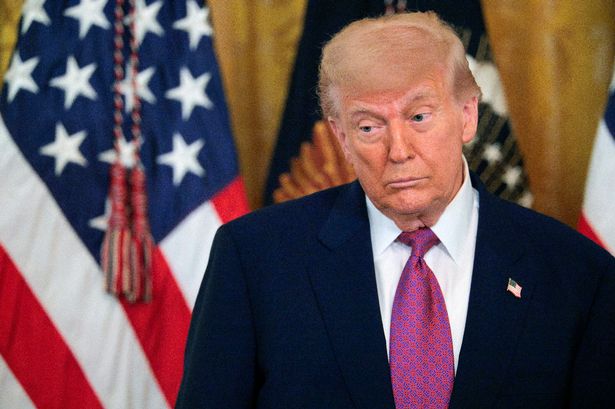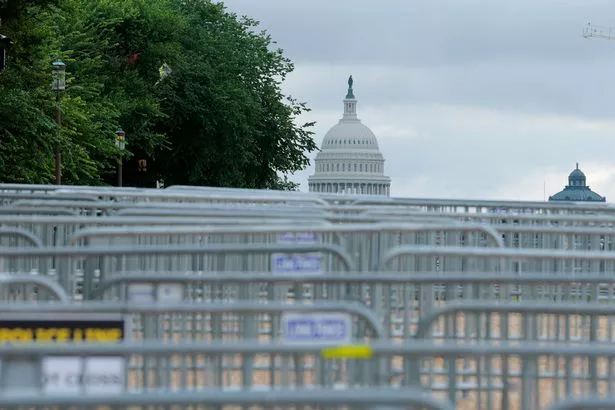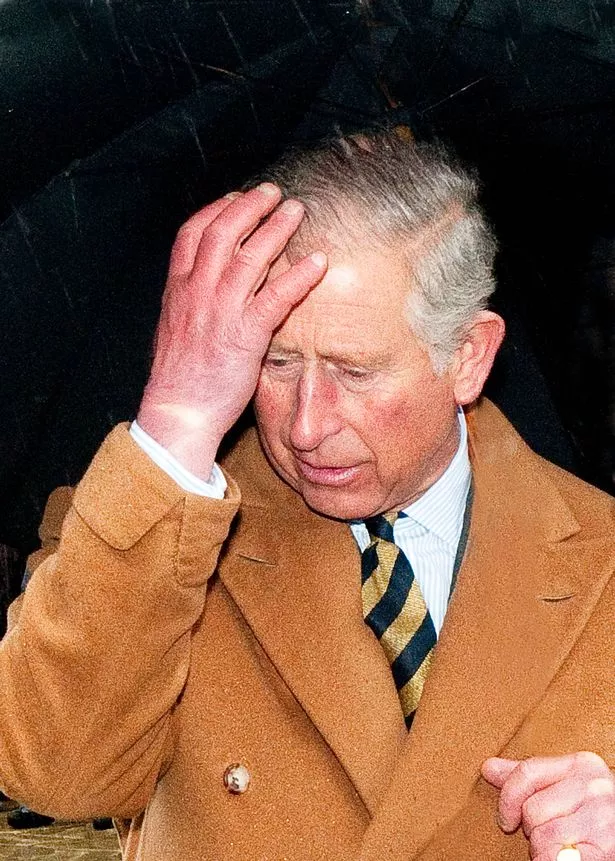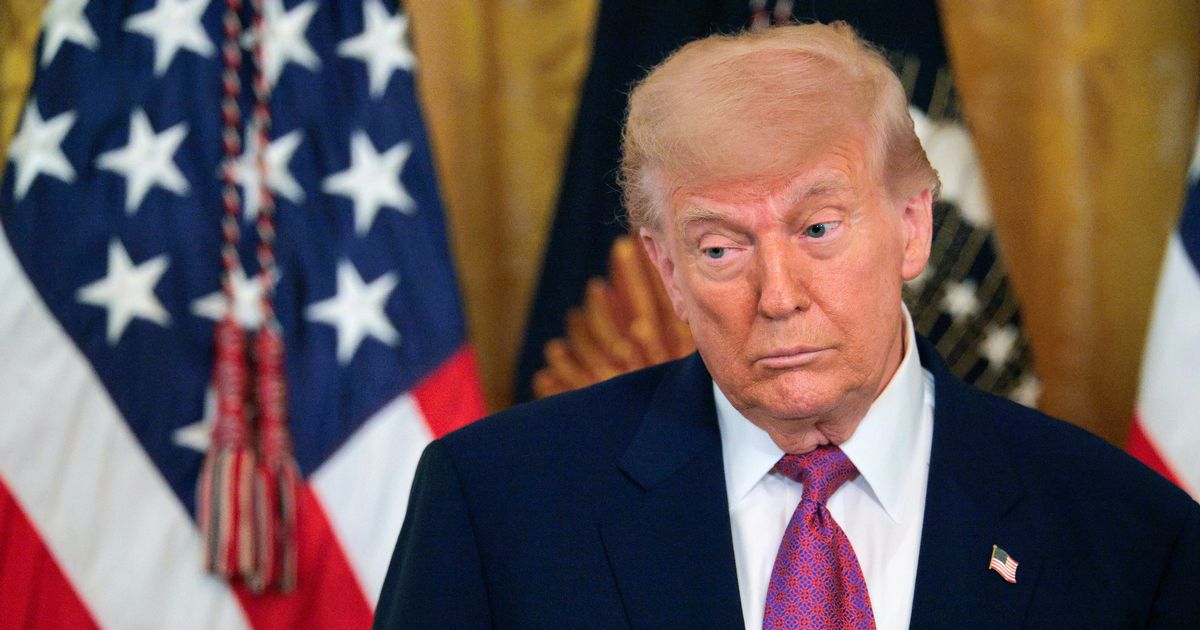Thousands turned out to protest Donald Trump’s military-style birthday parade — an unsurprising reaction as the President’s approval rating sinks to just 38%, according to experts.
18:23 ET, 14 Jun 2025Updated 20:59 ET, 14 Jun 2025
 Donald Trump’s priorities are in the wrong place, says expert, and the housands of people who came out to protest on Saturday seem to agree
Donald Trump’s priorities are in the wrong place, says expert, and the housands of people who came out to protest on Saturday seem to agree
Donald Trump marked his birthday Saturday with a $45 million parade, styled as a military tribute — but one expert says he should be more focused on his plummeting approval rating.
We spoke with Rich Rubino — a political analyst, author, and historian — who had plenty to say about the President’s priorities.
With Trump’s approval rating hovering at just 38%, Rubino warns he risks losing support from fellow Republicans on key legislative votes.
READ MORE: Furious protesters in DC en masse compare Trump’s military parade to Hitler ceremonyREAD MORE: Donald Trump makes awkward blunder while claiming ‘rainy parade brings good luck’
Rubino spoke in a wide-ranging Zoom interview that touched on the role of trust in American governance, the president’s approval rating, and deeper cultural and political divisions shaping the country.
Rubino warned that Trump risks losing the support of fellow Republicans on critical legislation. He said trust in government remains central to the health of a democracy — and extravagant displays of power, like Trump’s birthday parade, might alienate independent voters.
 The Army expects as many as 200,000 people could attend the festival and parade
The Army expects as many as 200,000 people could attend the festival and parade
“If you think the government is not doing that, is not protecting you,” he said, “then you essentially have riots in the street or something to that effect. So that’s where I think trust is so important.”
Rubino cited the Social Contract Theory to explain how government legitimacy is rooted in a basic exchange between people and their leaders.
“You have a political process,” he said. “If you go back to why we have government in the first place, it goes back to Thomas Hobbes and John Locke. They had this idea — the Social Contract Theory — essentially, you abdicate certain rights that you have in the state of nature, where we originally come from. People have absolute rights, but they also have no security. You give up a certain amount of security to the sovereign, and the sovereign in return protects you.”
The concept of trust is especially relevant, Rubino noted, when it comes to optics like parades honoring a sitting or former president. While the event was billed as a military celebration, Rubino said critics claim it bears more resemblance to authoritarian pageantry than American tradition.
“They once asked Dwight D. Eisenhower about the idea,” Rubino recalled. “And he said, ‘For us to try and imitate what the Soviets are doing in the red square would make us look weak.'”
Rubino added: “Critics will say other countries, mostly authoritarian or totalitarian regimes, if you will, do that. This country doesn’t really do that.”
 Trump reportedly used the 250th Anniversary of the US Army as an excuse to throw a parade in his honor (Image: AP)
Trump reportedly used the 250th Anniversary of the US Army as an excuse to throw a parade in his honor (Image: AP)
The last U.S. military parade took place in 1991 after the Persian Gulf War, with Trump’s event, reportedly costing between $20 million and $60 million, being the firstin over thirty years.
The conversation eventually turned to the broader state of political division in the U.S., where Rubino pointed to a growing rift between urban and rural America — one he believes is no longer driven by economics.
“I would say the biggest issue is the bifurcation of the electorate,” he said. “Politically, I think there is such division right now, in terms of values, and between groups of people. I think there are divisions between urban America and rural America.”
That divide, he added, used to follow income lines. But that’s changed.
 Trump’s birthday parade falls on the same day as King Charles’s birthday parade, also known as Trooping the Colour (Image: undefined via Getty Images)
Trump’s birthday parade falls on the same day as King Charles’s birthday parade, also known as Trooping the Colour (Image: undefined via Getty Images)
“It used to be that politics used to be based on income levels, at least, if you go back to Franklin Roosevelt’s New Deal, Lyndon Johnson’s New Society, for example — people with lower incomes tended to vote Democrat, people with higher incomes tended to vote Republican,” Rubino said.
“Now you have a scenario, where very wealthy people in places like the Silk Stalkings District of New York City in Manhattan are voting Democrat and people in rural America, with lower incomes, are voting Republican.”
According to Rubino, “They’re doing this more over value issues than they are over economics issues, and values have really supplanted as the main fulcrum, the main division, the main point of bifurcation in the American body politic.”
Returning to Trump’s birthday celebration, Rubino emphasized the disconnect between campaign promises of unity and the reality of office.
“There’s like a laundry list of issues that urban and rural America disagree on,” he said. “And for somebody to unify — all President candidates say, ‘I’m going to unify the country, I’m going to unify the country’ — they have to somehow unify urban and rural America.”






